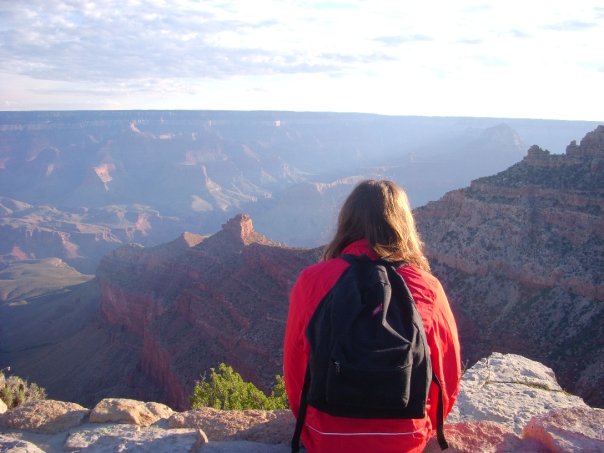At the ripe old age of 10, I decided the world had nothing left to impress me. It took another 10 years, plus 42 days living out of a ’96 Pontiac Bonneville, to understand that I might have prematurely thrown in the towel.
Standing on the South Rim of the Grand Canyon, I was a college sophomore, realizing for the first time in a while that I was still capable of experiencing awe. It was a feeling I had thought was lost to me, the jaded traveler, and completely nonexistent in the U.S., a country so far from exotic I didn’t even need a visa to enter.
In truth, the United States was one of the most foreign countries I had ever visited.
As the daughter of a foreign service officer, I spent my youth building a resistance to wonderment. My father, born and raised on Long Island, was thrilled to relocate our family again and again—Hong Kong, Kazakhstan, Hungary, Taiwan—and less thrilled that we didn’t share his enthusiasm.
When I was in middle school, my dad took us to Turkey.
“It’s the Black Sea!” he bellowed against the wind as we stood on a scraggly cliff, looking down into the water. “Why aren’t you more excited?”
Yeah Dad, very cool. Looks kind of like the Caspian. Not as blue as the Mediterranean. Can we go back to the hotel now?
To me, the great mysteries of the world were on the other side of the Atlantic—like supermarkets stocked with entire aisles of just cereal. During our brief visits to the U.S. in the summertime, I became my father, urging everyone to take another look.
“Eighteen different varieties!” I bellowed. “And that’s just the bran cereals!”
After nearly 18 years of living abroad, the white rabbit came knocking on my door: I was Alice, and I was very late for my date with my identity as an American. After tumbling down the rabbit hole and into a Boston University dormitory, I emerged to find social norms had been turned on their head. I had to relearn the simplest of behaviors, from how to greet new friends (two kisses yields bizarre reactions) to how to communicate via telephone (I instantly hated texting). My roommate Megan, an old friend from Budapest and a fellow confused nomad, shared my sense of vertigo. We couldn’t call ourselves American when we were clearly immigrants, so we decided to spend the summer after freshman year working on our repatriation. We picked an adventure that Hollywood had taught us was pure Americana: the road trip.
To me, the U.S. had always represented stagnation, not adventure. Yes, it was nice to have the option of buying orange juice with six degrees of pulpiness, but it was also too easy. The U.S. was air conditioning and pre-sliced bread, roads with no potholes that led to Nowhere Special. My goal for the road trip was to soak up as many uniquely American experiences as possible. We would eat breakfast at Denny’s, pose like goofy tourists at Four Corners, crash at campgrounds. But nothing was going to surprise me.
Then five days into the trip, a friend invited me, an adamant gun control advocate, to go skeet shooting on his ranch outside of Dallas. As it turns out, shattering clay pigeons into pieces is gleefully satisfying. And after a lifetime of cracking Dukes of Hazzard jokes about all formerly Confederate states, I was won over by the hospitality of the South.
Over the next few weeks, we soaked up jazz in New Orleans. We shared a campfire with a group of Mormons in Yosemite and bonfires on the beach with fellow hostel guests in San Diego. A friend from the hostel, Nico, showed me how to detail a car—and suddenly I was a girl who could open the hood of a car and point out the carburetor.
When it was time to move on from San Diego, Nico helped us repair Bonnie (our affectionately named, sputtering Bonneville) and sent us back on the pothole-less road in the direction of the Grand Canyon. It was by no means our final destination, just one more Wonder of the World to check off the list. We camped a short walk from the rim, but trees obstructed our view of the incredible landscape. When I finally saw the canyon, not even the jaded traveler could cringe at the cliched phrase that came to mind: awe-inspiring.
Every time we got close enough to see the massive canyon, it took my breath away. If I so much as turned my back on the view and then spun around I would squeal again, like a patient with short-term memory loss receiving the same present day after day.
I put myself in the boots of pioneers exploring the west and tried to imagine what it would be like to truly experience the canyon for the first time. What would it be like to stumble upon this geological marvel without knowing what you had found? I realized that their desire to travel didn’t make the pioneers unpatriotic, but a part of the country’s deep-rooted history of exploration. It is a part of the American identity, and a part of me.
Photo captions (in order): Sarah at the Grand Canyon; first breakdown in Texas; Megan driving in Texas; Megan at the Grand Canyon; Sarah at the Four Corners; Sarah at a hostel in California; Sarah reaches the Pacific Ocean after 3,000 miles of driving; Sarah on a ferry in New Orleans.

Hey I go to BU too! Great article.
You got an American driver’s license by the end of your freshman year? You were pretty on top of things.
LikeLike